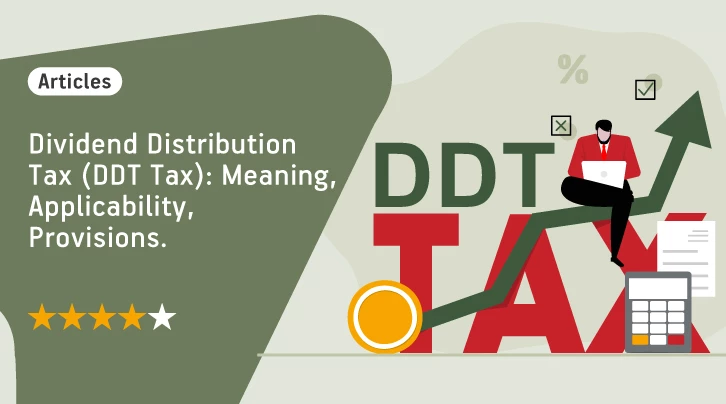Dividend Distribution Tax (DDT Tax) was applicable to the dividends distributed by businesses and mutual fund schemes. But it has been abolished since April 1, 2020. Read this post to learn more about DDT tax.
Investors share ownership by investing in shares of a company. Profit-making companies sometimes distribute dividends and share their profits with their shareholders.
Something similar is done in mutual funds. The IDCW (Income Distribution cum Capital Withdrawal) option, previously known as the dividend option, pays dividends to the investors from the profits generated by the scheme. Before April 1, 2020, a Dividend Distribution Tax (DDT Tax) was applicable to such dividends.
Here are some of the most important things investors should know about Dividend Distribution Tax-
What is Dividend Distribution Tax on Mutual Funds?
DDT was a tax charged on the dividends distributed by companies and fund houses to their investors. Under Section 115-O0 of the IT Act, the entities were required to deduct DDT @15% from the gross dividend payments. Under Section 2(22)(e), the Dividend Distribution Tax rate was 30% in cases of dividend payments on presumed profits.
Once the company or fund house had paid DDT on the dividends to the government, there were no tax implications of the dividend payment for the shareholders. In other words, the dividends were tax-free in the hands of the shareholders or investors.
Abolition of DDT Under the Finance Act 2020
The Finance Act 2020 abolished and repealed DDT Tax from April 1, 2020. As a result, businesses and fund houses are no longer required to deduct DDT from the dividend payments as the dividends are now taxable in the hands of the shareholders and investors.
The dividend income is now treated as income from other sources, and investors must pay taxes according to their income tax slab rate. For example, an investor from the 5% slab rate will pay a 5% tax on their dividend income, and someone from the 30% slab will pay a 30% dividend tax.
Also read: A Guide to Income Tax Slab for FY 2022-23 (AY 2023-24)
Why Was DDT Tax Abolished?
Due to DDT, the tax on dividend income in India was uniform for all investors, irrespective of their income. The tax equally impacted every investor as the distributable surplus for the company or fund house was reduced after paying the uniform tax rate. But that is no longer the case, as investors in the higher tax slab now pay a higher tax on dividends compared to others in the lower slabs.
The abolition of DDT has also made it a more level playing field for both IDCW and the growth options of a mutual fund scheme. Before investing, investors must analyse the advantages of choosing the IDCW option with regard to the taxes they’ll be paying on the dividend income and whether it is a more profitable choice over the growth option.
TDS on Dividends
While the DDT tax is abolished, dividend payments now attract TDS (Tax Deducted at Source) under Section 194K of the IT Act. Any dividend payment above ₹5,000 in a financial year attracts a TDS @10%. The company or fund house distributing the dividends deducts this amount from the dividend payments.
The details of this dividend TDS payment reflects in Form 26AS. Investors can use the same while filing tax returns and claiming a refund if they fall in the NIL tax slab or when their tax liability is lower than the deducted amount.
Taxes and Mutual Fund Investments
DDT no longer applies to the dividends investors receive from companies or fund houses. Instead, the investors pay taxes on their dividend income according to their tax slab. Moreover, if the annual dividend payment is above ₹5,000, the company distributing the dividends will deduct TDS@10%.
As taxes play an integral role in investments, ensure you thoroughly understand the tax implications of your mutual fund investments before investing. The assistance of an investment or tax advisor can help you make tax-efficient investments.
Mutual Fund investments are subject to market risks, read all scheme related documents carefully.






 1800-270-7000
1800-270-7000




